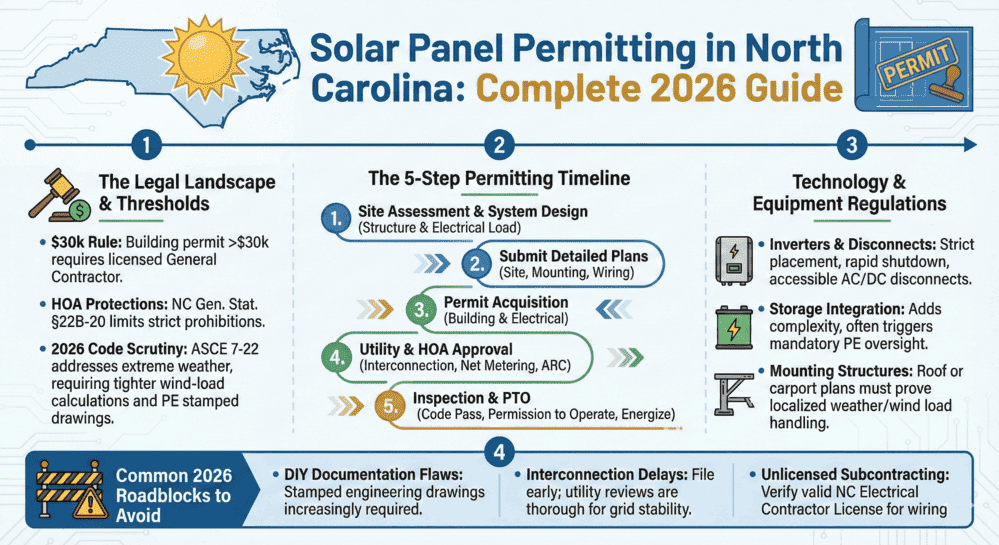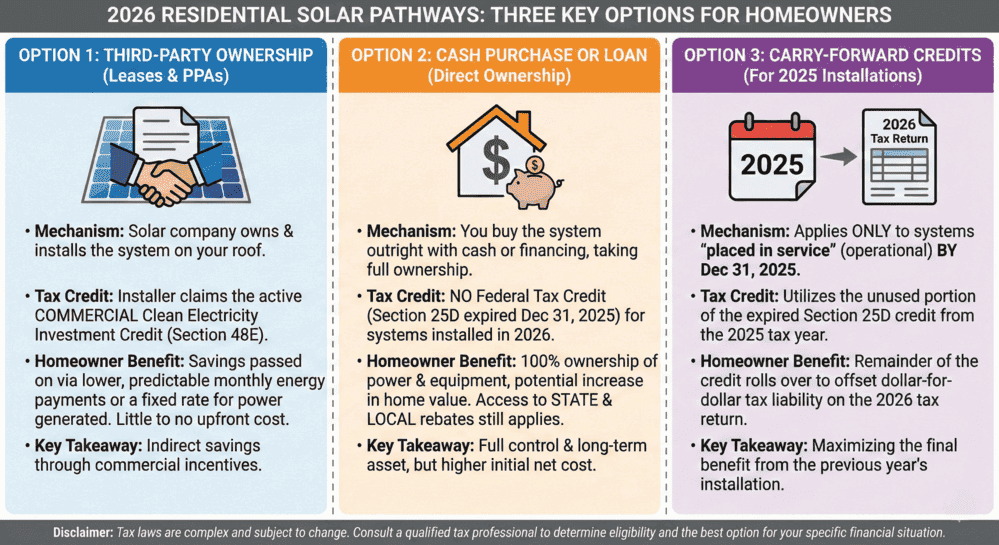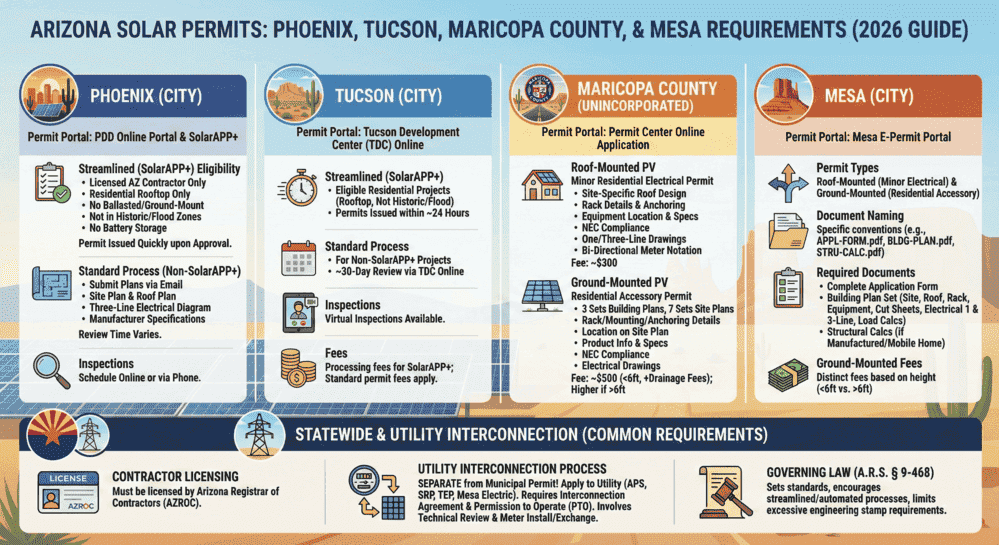Portland solar permits require approval from the Bureau of Development Services (BDS), Energy Trust of Oregon, and your utility company (PGE or Pacific Power) before installation. The complete solar permitting process takes 4-8 weeks and includes structural review, electrical compliance verification, and multiple inspections before receiving Permission to Operate (PTO).
What you need to know about Portland solar permits:
- Required documents: Site plan, electrical one-line diagram, structural engineering plans, and equipment specification sheets
- Two permit paths: Prescriptive Path (standard installations) or Engineered Systems Path (complex projects)
- Permit fees: $200-$600 for residential solar installations
- Inspection requirements: City BDS inspection, Energy Trust of Oregon inspection, and utility interconnection inspection
- Timeline: 2-3 weeks for BDS approval, plus 2-4 weeks for post-installation inspections
Why permits matter: Unpermitted solar installations are illegal in Portland, void homeowner’s insurance, disqualify you from net metering and state incentives, and create problems when selling your home. Properly permitted systems increase property value, ensure safety compliance with National Electrical Code (NEC) standards, and unlock federal Investment Tax Credit (ITC) and Energy Trust of Oregon incentives.

Why Do I Need a Solar Permit in Portland?
Let’s tackle the basic question first: what makes permits essential? Simply stated, permits prioritize safety and excellence. Portland’s Bureau of Development Services (BDS) holds the mandate to verify that all construction undertakings, solar installations included, satisfy recognized building and electrical standards.
Here’s how this benefits you:
Ensures Structural Safety: Your residence’s rooftop wasn’t initially engineered to accommodate a solar system. A structural assessment verifies that your roof can securely bear the additional weight of solar panel racking systems and mounting hardware, even throughout Portland’s rainy winters and periodic windstorms.
Guarantees Electrical Compliance: Solar panels produce substantial electrical output. The permitting procedure confirms all wiring, connections, and elements satisfy National Electrical Code (NEC) requirements, eliminating fire risks and ensuring dependable system operation.
Protects Your Property Value: A completely permitted and inspected solar setup represents a valuable enhancement. It boosts your home’s worth and provides prospective buyers confidence that installation followed proper codes. Non-permitted installations can generate substantial complications during property transactions.
Unlocks Incentives and Utility Connection: For grid connection (termed “net metering”) through Portland General Electric (PGE) or Pacific Power and to access beneficial incentives from the Energy Trust of Oregon, your installation requires permitting and authorization.
As an Energy Trust of Oregon trade ally, our team doesn’t merely follow these standards but surpasses them, guaranteeing your system delivers optimal performance and durability.

Portland’s Solar Permit Pathway: A Simple Guide from Start to Finish
Navigating the permitting process independently can feel as overwhelming as attempting to locate a particular book in Powell’s City of Books without guidance. The positive news? You don’t need to tackle it alone. As experienced solar professionals, we deliver a comprehensive turnkey solution, meaning we manage every single phase of the permitting process on your behalf. Here’s an insider’s view of the journey we embark on together.
Step 1: Begin with a Personalized Consultation and Custom System Design
Everything begins with a discussion. We’ll arrange a complimentary, no-pressure consultation to understand your energy objectives and evaluate your property. Our specialists will examine your roof’s positioning, shading from neighboring Douglas firs, and your past electricity consumption. Utilizing this information, we craft a customized solar panel system matched to your particular requirements, whether it’s a residential system to dramatically cut your electric bills, a commercial installation for your enterprise, a battery backup for energy independence, or a comprehensive off-grid configuration.
Step 2: Complete Engineering and Assemble a Full Permit Application Package
After you approve the design, our technical team begins preparing an extensive application package for the City of Portland. This goes far beyond a basic form; it’s a thorough collection of engineering documents that demonstrates your project is secure and strategically planned. This package generally includes:
A Detailed Site Plan: This property map indicates where the solar panels, inverter, and additional equipment will be positioned.
An Electrical One-Line Diagram: This serves as the electrical blueprint for your system, illustrating how the panels link to the inverter and your home’s primary electrical panel.
Structural Engineering Plans: These drawings specify how the racking and panels will be secured to your roof, including calculations proving the roof can support the load. This is an essential step for every residence, from a contemporary build in the South Waterfront to a historic home near Pittock Mansion.
Equipment Specification Sheets: We provide the manufacturer’s spec sheets for your solar panels and inverters so the city confirms we’re utilizing high-quality, certified equipment.
Step 3: Submit Your Solar Permit Application to the Bureau of Development Services (BDS)
With the application package finalized, we file it with the City of Portland’s Bureau of Development Services (BDS) through their digital portal. The official BDS solar permits page identifies two primary routes: the “Prescriptive Path” for straightforward, standard installations and the “Engineered Systems Path” for more intricate projects. Our Portland solar permit specialists identify the appropriate route for your system to guarantee a seamless review process. We manage all the electronic paperwork and correspondence, so you remain worry-free.
Every solar permit submission requires the following documentation uploaded in Adobe Acrobat (.pdf) format:
- The Structural Design Criteria. Structural design specifications must appear on the initial page of drawings, bearing the stamp of an Oregon-registered design professional. Design criteria must contain, at minimum:
- Sloped roof snow load design specification (minimum threshold of 20 psf),
- Baseline wind speed for design purposes (minimum 98 mph) with exposure classification, and
- Dead load specifications for solar panel systems.
- For solar roof tile installations exempt from Oregon registered design professional requirements, documentation must explicitly state that (1) total installed system weight, including all above-sheathing components, does not exceed 4 psf, (2) solar tile installation occurs directly onto existing sheathing after complete removal of all roofing material above existing sheathing, and (3) a declaration confirming installation compliance with 2022 Oregon Structural Specialty Code section 1507.16 or 2021 Oregon Residential Specialty Code section 905.16.
- Site Plan
- Fire Access Path (Exemption applies to solar tile installations)
- A roof framing plan (Exemption applies when roof utilizes pre-engineered trusses and for solar tile installations. Alternative requirement: roof plan displaying solar panel arrangement.)
- A roof cross-section (Exemption applies when roof utilizes pre-engineered trusses and for solar tile installations.)
- System Racking Attachment (mandatory for both Engineered and Prescriptive Pathways)
- Engineering calculations bearing an Oregon-registered design professional stamp are mandatory for all engineered systems. Exception: Solar roof tile installations are exempt from calculation requirements provided (1) total installed system weight, including all above-sheathing components, does not exceed 4 psf, (2) solar tile installation occurs directly onto existing sheathing after complete removal of all roofing material above existing sheathing, and (3) uniform support exists for all solar tiles (both active and inactive tiles) across existing sheathing. Alternative submission: certification letter confirming installation meets 2022 Oregon Structural Specialty Code section 1507.16 or 2021 Oregon Residential Specialty Code section 905.16 requirements, accompanied by manufacturer’s installation specifications.
Step 4: The City Conducts a Thorough Plan Review
This is when the city’s specialists perform their thorough examination. Two primary reviewers will assess our plans:
The Structural Reviewer: They verify the engineering to confirm the system’s design is solid and your roof is capable of handling the task.
The Electrical Reviewer: They examine the one-line diagram to verify it adheres to all electrical codes for a secure and dependable grid connection.
Occasionally, a reviewer may request a slight clarification or adjustment. This is a standard part of the procedure, and our seasoned team responds promptly and precisely to maintain project momentum without interruption.
Step 5: Receive Your Permit and Move Forward to Installation!
When the reviewers are content and have authorized the plans, the City of Portland issues the official electrical and structural permits. This is the authorization we’ve been anticipating! It signifies we can formally schedule your installation.
From Approval to Activation: Your Step-By-Step Solar Inspection Journey
To guarantee quality, safety, and compliance for incentives, there’s a vital, multi-layered inspection process that occurs after our work is complete. Your system must stay inactive during this entire period.
1. City of Portland Inspection: The initial step is the one we outlined earlier. Arrange an inspection with the city’s BDS. An inspector visits your residence to confirm that the installation perfectly aligns with the approved plans, examining both structural and electrical work.
2. Energy Trust of Oregon Inspection: A separate inspection is mandated by the Energy Trust of Oregon. Your Installer will coordinate for an Energy Trust inspector to visit your property.
They employ their own thorough checklist, which frequently exceeds standard code, to verify the highest levels of quality and performance. This is a critical step in quality assurance for our customers.
3. Utility Interconnection Inspection: After both the city and the Energy Trust have approved the installation, you can proceed to the final checkpoint: your utility company (PGE or Pacific Power).
Your installer will submit all the passed inspection reports and formally request their final interconnection inspection. A utility technician will visit your home to inspect the system’s connection to the power grid and install or reprogram your new net meter. This meter is what enables you to receive credit for the surplus energy you send back to the grid.
PTO Approval: The Moment Your Solar System Goes Live
Only after the utility company has finalized its inspection and provided its final authorization do we receive the official “Permission to Operate” (PTO). This is the moment we’ve all been anticipating. Once we have that PTO authorization, we will visit your home, guide you through your new system, and officially activate it.
Witnessing your meter spin backward for the first time is a genuinely satisfying moment. It’s the culmination of a well-planned, expertly executed, and multi-agency-approved process that ensures you decades of clean energy and savings.
Solar Permit Solutions
Skip the Permit Headaches
We design plan sets that pass inspection the first time. Code-compliant, PE-stamped, accepted by AHJs nationwide.
Solar Permit Fee Estimates
The fee schedule presented in the tables below provides estimated costs. Actual permit fees vary based on solar panel system dimensions and classification, along with the selected review pathway (prescriptive pathway or engineered system). Trade permit fees for electrical or plumbing work are determined by system capacity or fixture quantity specified in the trade permit submission.
Prescriptive Pathway Estimate
Engineered Systems Pathway Estimate
Conclusion
Transitioning to solar energy represents one of the most impactful decisions Portland homeowners can make for their financial future and environmental legacy. While the permitting process may initially appear complex, understanding each phase transforms it from an intimidating obstacle into a straightforward pathway toward clean, renewable energy.
The multi-layered inspection and approval system, from the Bureau of Development Services to the Energy Trust of Oregon and your utility provider, exists to protect your investment, guarantee safety, and ensure your system performs optimally for decades to come. These safeguards aren’t bureaucratic red tape; they’re the foundation of a reliable solar installation that will increase your property value, slash your electricity bills, and contribute to Portland’s commitment to sustainability.
When you partner with experienced solar professionals who handle the entire permitting journey on your behalf, you can focus on what truly matters: envisioning a future where your home runs on clean energy captured from Oregon’s abundant sunshine. From the initial consultation through that exciting moment when you receive Permission to Operate and watch your meter spin backward for the first time, every step brings you closer to energy independence.
The sun rises over Mount Hood every morning, casting light across our beautiful city. Now it’s your turn to harness that natural power, knowing that your fully permitted, professionally installed solar system is built to code, backed by warranties, and ready to deliver clean energy for generations to come.
FAQs
Skip the Permit Headaches
We design plan sets that pass inspection the first time. Code-compliant, PE-stamped, accepted by AHJs nationwide.
Frequently Asked Questions
The complete permitting and inspection timeline typically ranges from 4 to 8 weeks, though this can vary based on the city's current workload and the complexity of your installation. The Bureau of Development Services usually reviews and approves standard residential solar permit applications within 2-3 weeks. After installation, the multi-step inspection process, including city, Energy Trust of Oregon, and utility inspections, adds another 2-4 weeks before you receive Permission to Operate. Working with experienced solar installers who have established relationships with these agencies often results in faster processing times, as they know exactly what documentation is required and how to avoid common delays.
No, you shouldn't have to handle any permitting paperwork or inspections personally when working with a full-service solar installer. Reputable solar companies provide turnkey solutions, meaning they manage every aspect of the permitting journey, from preparing engineering documents and submitting applications to the BDS to coordinating all required inspections with the city, Energy Trust of Oregon, and your utility company. Your primary role is to approve the initial system design and be available for the inspector visits to your property. The solar company handles all communication, paperwork, fees, and follow-ups with the various agencies involved.
While rare with professional installers, if an inspection identifies an issue, your solar company will correct it promptly at no additional cost to you. The inspector will note specific items that need adjustment, perhaps a wiring connection that needs securing or a mounting bracket that requires reinforcement. Your installer will make the necessary corrections and schedule a re-inspection. Your system will remain off until all inspections are passed and you receive Permission to Operate. This is why choosing an experienced, licensed solar installer with a proven track record is crucial; they get installations right the first time, minimizing delays and ensuring compliance with all codes.
Yes, the City of Portland charges permit fees for solar installations, but they're typically modest and included in your overall solar installation quote. Permit fees vary based on your system size and complexity, generally ranging from $200 to $600 for residential installations. These fees cover the city's plan review and inspection services. Some solar permit companies include these fees transparently in their initial proposal, while others may list them as separate line items. Additionally, there may be small utility interconnection fees charged by PGE or Pacific Power. Always ask for a complete breakdown of all costs, including permitting fees, when comparing solar quotes.
Absolutely not. Installing solar panels without proper permits is illegal in Portland and creates serious risks and consequences. Unpermitted solar work violates city building codes and can result in fines, forced system removal, and complications with your homeowner's insurance. More importantly, unpermitted installations aren't eligible for net metering connection with your utility company, meaning you can't send excess energy back to the grid or receive credits on your electric bill. You'll also forfeit valuable state incentives from the Energy Trust of Oregon, which can amount to thousands of dollars. Perhaps most critically, unpermitted solar systems can create major obstacles when selling your home, as buyers and their lenders typically require proof of permitted work. Always work with licensed solar installers who handle permitting properly.
Yes, proper permitting is the gateway to accessing valuable solar incentives in Oregon. When your installation is fully permitted and passes all required inspections, including the Energy Trust of Oregon inspection, you become eligible for state incentives that can significantly reduce your overall investment. Additionally, permitted systems qualify for the federal solar Investment Tax Credit (ITC), which allows you to deduct a substantial percentage of your solar installation costs from your federal taxes. Your utility company will also approve net metering, enabling you to receive credits for excess energy your system produces. Without proper permits and inspections, you forfeit all these financial benefits, which is why the permitting process is so valuable despite the time it requires.
SPS Editorial Team
Solar Permit Solutions
Solar Permit Solutions provides professional solar permit design services for residential, commercial, and off-grid installations across all 50 states. Our team ensures permit-ready plan sets delivered fast.
Related Articles

New 2026 North Carolina Solar Permit Guide: Duke Energy & Storage Rules
Learn North Carolina solar panel licensing and permitting requirements. Discover...

Section 25D Expiration: Homeowner Options In 2026
The Section 25D Residential Clean Energy Credit, which covered 30% of residentia...

Solar Permits In Arizona: Phoenix, Tucson, Maricopa County, And Mesa Requirements (2026 Guide)
Arizona solar permitting at a glance: Arizona HB2301 now requires every municipa...
